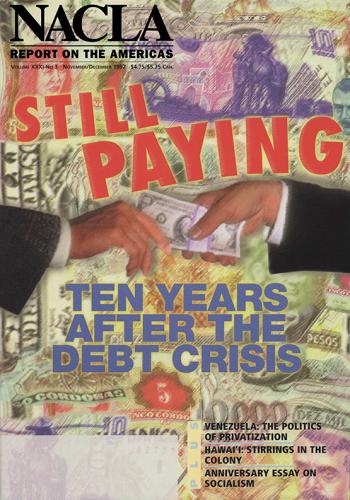Article
Twentieth century socialism is moribund. In the Americas, socialist-oriented movements were dealt severe blows by the elec- toral defeat of the Sandinistas in 1990, the general impasse of Central American revolutionary movements and the crisis of Cuban Communism with the collapse of the Soviet Union.
This summer, over 2000 activist, politicians and policymakers gathered in Caracas with the aim of reinserting the debt back in the debate if Latin American development. Back in the 1980s, in the wake of Mexico's six-month debt moratorium of 1982-1983 and the subsequent rescheduling of most of the region's foreign debt, all discussions of Latin American The Diabolical Debt, development required some consid- conference on "The eration of the "debt crisis.
Bolivia's vulnerability as a heavily indebted country has narrowed its opportunities to choose policy options that would improve the quality of life of its poorest and most vulnerable communities. BY MARIE DENNIS aria and Rodrigo P6rez live with their six chil- dren in two small rooms on the outskirts of Cochabamba, one of Bolivia's larger cities.
On January 17, 1993, on the hundredth anniversary of the overthrow of the inde- pendent Hawai'ian Kingdom, more than 15,000 Kanaka Maoli-indige- nous Hawai'ians-marched to the site of the Kingdom's authority, Iolani Palace in Honolulu, demand- ing the restoration of Kanaka Maoli sovereignty.' The march reflected a renaissance in culture, language and traditions among people of Kanaka Maoli ancestry.
Guatemala's Peace Accords Agree with Susanne Jonas ["The Peace Accords: An Ending and a Beginning," May/June 1997] that the signing of the Peace Accords in Guatemala was an historic occasion, formally ending a 30 year-old civil war that left around 200,000 mostly Mayan Indians dead or disappeared. Yet I have some reservations.
Victims of the War Exhumed in Guatemala CHAJUL, QUICHE AUGUSI 30, 1997 In the middle of a field of high corn, under strong sunlight, 48-year-old Caterina P6rez L6pez kneels beside a small rectangular pit. In hushed tones she identifies the remains of her husband's body, a skeleton lying face down in the ground.
The Undermining of the Sandinista Revolution by Gary Prevost and Harry E. Vanden (eds.
A Movement in the Making On the first stop of Bill Clinton's trade-and-invest- ment tour of South America last month, he congratulated his Venezuelan hosts for finally (he hoped) opening their economy to U.S.
The Mexican peso crisis of December, 1994, pro- duced a series of rapid consultations between U.S.
Mexico's $170 billion foreign debt is the second largest in the Third World, surpassed in size and complexity only by that of Brazil. Its growth has been exponential since the mid-1970s, even through the prolonged debt crisis of the 1980s.
The debates over privatization reflect not only growing frictions between Venezuela's five major political parties, but also deep divisions within them. W hen Venezuela's Imataca Forest Reserve, home to five major indigenous groups, and prospecting grounds to thousands of independent, wildcat- ting gold miners, was opened to pri- vate concessions by presidential decree this year, a fierce debate ensued that exposed some widening rifts within Venezuela's fractious party system.

